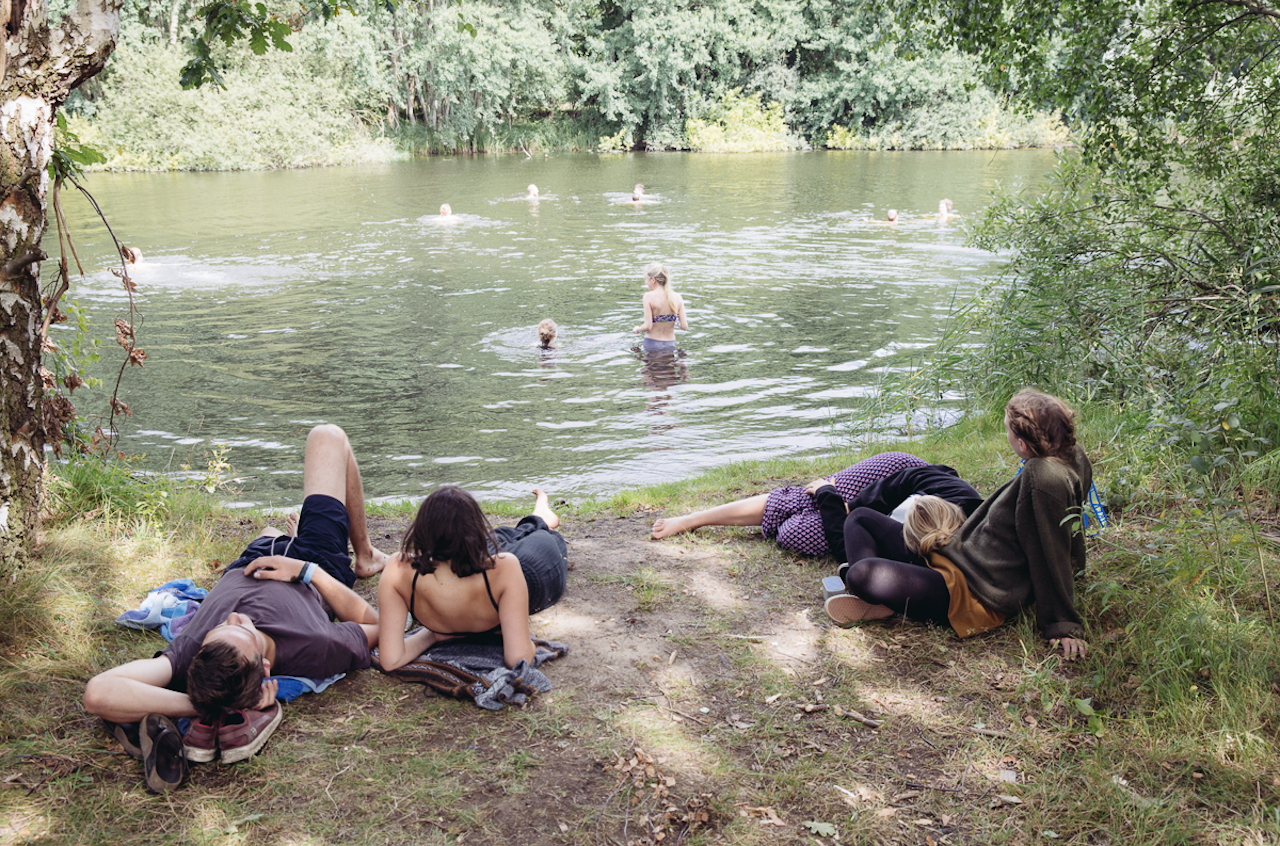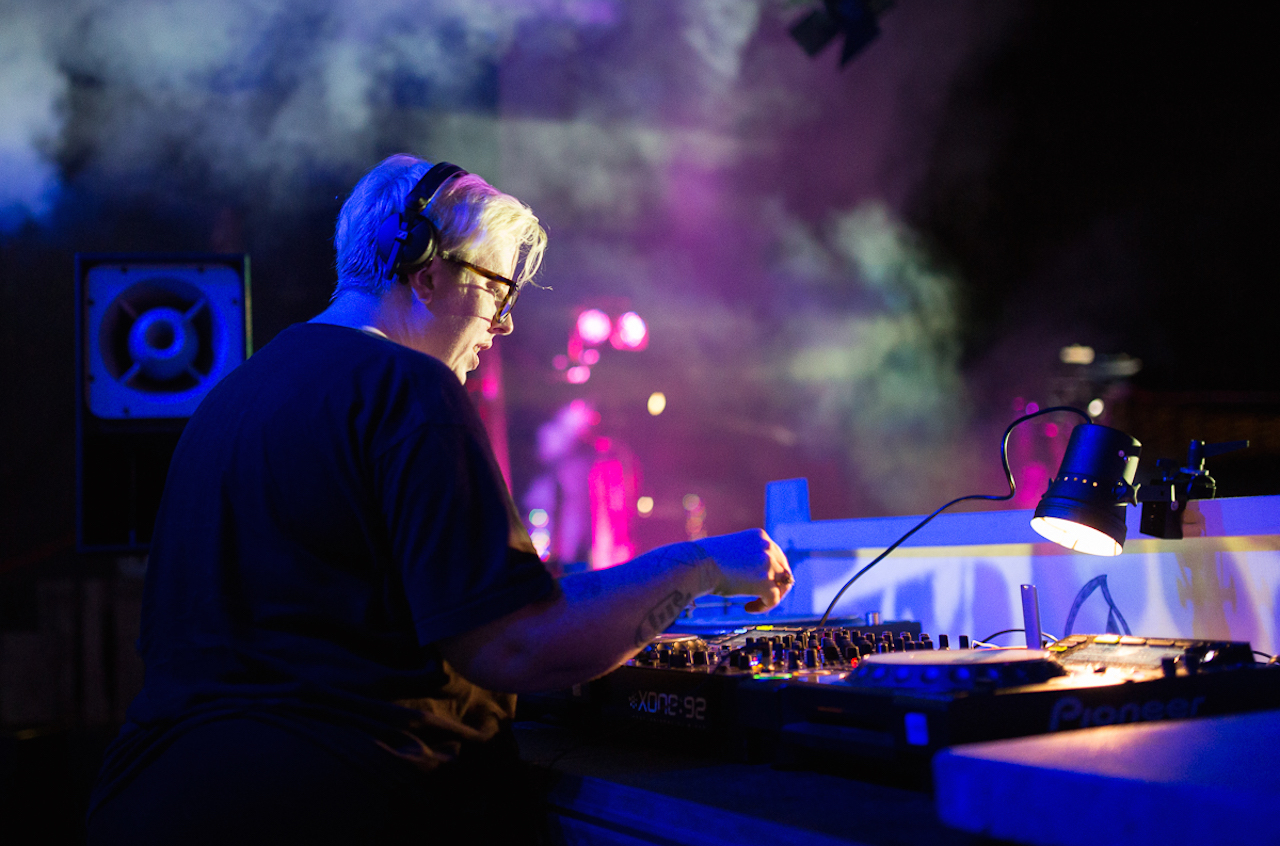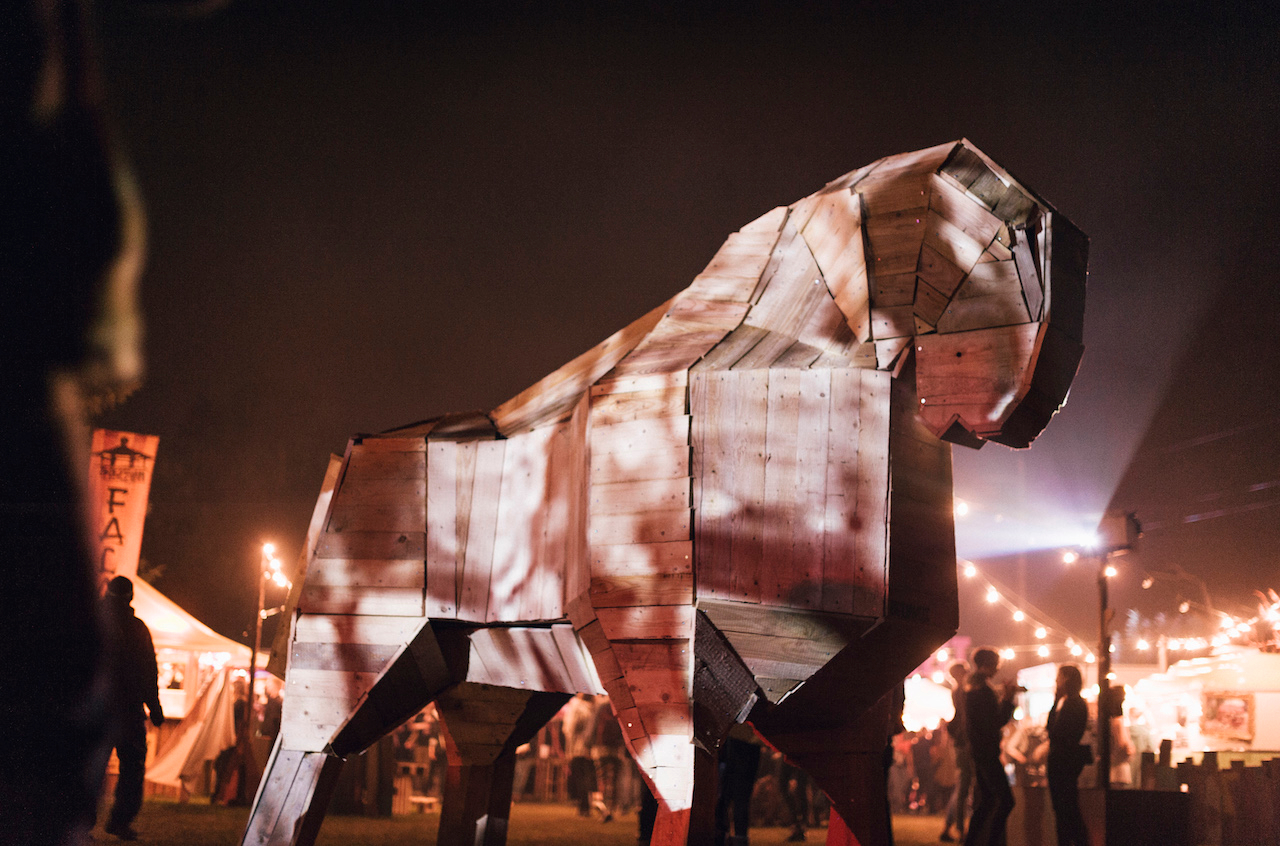- There's a cozy remoteness to the Fuchsbau Festival site—an old farm in Northern Germany not far from Hannover—that helps you feel hidden away from the rest of the world. (It's a fitting name: Fuchsbau translates from German as "fox den.") The three-day festival nearly sold out for its fifth edition, hosting 3,500 mostly young campers that seemed as eco-friendly and socially conscientious as the festival organisers.
Fuchsbau has four official stages, as well as one tiny, unofficial one tucked away in a far corner of the site that wasn't listed on any map or schedule. The Impuls stage hosted only film screenings, talks and workshops, almost all with a strong political edge, while the Kollision stage split its programme between talks and music. The lineup was an ambitious mix of DJs, live acts and bands of all stripes.
Affekt, Fuchsbau's main stage, featured some thoughtful set design: the scaffolding rigs that formed a ring around the center of the floor were encased in wooden planks and bark to give the impression of tree trunks. It was here that Darkstar earned their headline billing, dropping hits like "Aidy's Girl Is A Computer" and "Pin Secure" in a set that highlighted them as a brilliant electronic pop act. Their live rendition of "Pin Secure" featured some particularly gorgeous interplay between counterpoint synth lines and vocals. The following night in the same slot, Svedzalia had the smoky voice of a classic jazz singer, resonant and with unique phrasing. But her band—a live drummer and two keyboardists—didn't fulfil the promise of her producer-led tracks, which in turn exposed some thinness in the songwriting and lyrics.
Though a large crowd gathered for Le1f's set, the applause was never as enthusiastic as it should have been for a rapper with such a clean, versatile flow, good rhyme structure and sharp dance moves. The bigger moments, like when he rapped in double-time or began twerking with his two dancers, at least got some appreciative howls. The Black Madonna, on the other hand, had little trouble getting the crowd moving. Her set was tight and dynamic, leading with electro before veering into techno with smatterings of house diva vocals.
At the festival's other outdoor stage, 212° F, Berlin-based DJs Perera Elsewhere and Sarah Farina provided an energetic one-two punch of bass. Both stitched together diverse selections, with the former leaning more towards footwork and the latter dipping into dubstep and kuduro. Throwing Shade, who's more of a selector than a DJ, turned the space into a chill-out zone with her vintage sounds, touching on lovers rock, loungey '60s pop and disco-funk.
Indoors at Impuls, the stage's intriguing program was hampered by a number of schedule delays, poor audio quality and sound bleed from the neighbouring Kollision stage. Overall, it felt like a bit of an afterthought, though the second half of Joel Moffett's brutally funny and poignant portrait of a trans love affair, The Technical Difficulties Of Intimacy, did provided a moment of joy. Another happy accident was German artist Ivana Rohr's Kill Your Darlings installation, which featured an air rifle shooting range somehow connected to an electric typewriter that fired out automatic poetry if you hit your targets. Violent, beautiful and fun, it thoughtfully illustrated the festival's overarching theme: "The Heat Of The Battle."
Kollision was the most versatile and experimental space. Amnesia Scanner played here on Saturday night, presenting their club deconstructions to a foggy, blacked-out room. Their sound, a mix of vocal narratives, cyber melodies and heavy low-end frequencies, is just as dystopian, if less specific, than their extraordinary Angels Rig Hook audio play. It can seem lofty to some, but at Fuchsbau it inspired some of the most frenzied dancing of the weekend. There really is nothing else like it out there right now.
Staffed by volunteers and with a stated aim of enriching the local Hannover culture, Fuchsbau set out to achieve a lot. The organization was mostly there, though some scheduling problems meant that at times there was only one stage open, which resulted in the junge norddeutsche philharmonie, North Germany's youth orchestra, performing their experimental if rickety presentation of Stravinsky's modernist classic, Rite Of Spring, to the biggest crowd of the weekend. The 30-strong spectacle was a highlight for many, but it also made the festival feel like a village fête. That none of the onsite literature was in English suggests that the team are still unconcerned with pulling an international audience, though I expect that'll change in a year or two. Overall, it was an interesting peek into provincial German life and how it can be simultaneously parochial and unexpectedly sophisticated.
Photo credits /
Isabel Machado Rios
Jan Helge Petri
 Indoors at Impuls, the stage's intriguing program was hampered by a number of schedule delays, poor audio quality and sound bleed from the neighbouring Kollision stage. Overall, it felt like a bit of an afterthought, though the second half of Joel Moffett's brutally funny and poignant portrait of a trans love affair, The Technical Difficulties Of Intimacy, did provided a moment of joy. Another happy accident was German artist Ivana Rohr's Kill Your Darlings installation, which featured an air rifle shooting range somehow connected to an electric typewriter that fired out automatic poetry if you hit your targets. Violent, beautiful and fun, it thoughtfully illustrated the festival's overarching theme: "The Heat Of The Battle." Kollision was the most versatile and experimental space. Amnesia Scanner played here on Saturday night, presenting their club deconstructions to a foggy, blacked-out room. Their sound, a mix of vocal narratives, cyber melodies and heavy low-end frequencies, is just as dystopian, if less specific, than their extraordinary Angels Rig Hook audio play. It can seem lofty to some, but at Fuchsbau it inspired some of the most frenzied dancing of the weekend. There really is nothing else like it out there right now.
Indoors at Impuls, the stage's intriguing program was hampered by a number of schedule delays, poor audio quality and sound bleed from the neighbouring Kollision stage. Overall, it felt like a bit of an afterthought, though the second half of Joel Moffett's brutally funny and poignant portrait of a trans love affair, The Technical Difficulties Of Intimacy, did provided a moment of joy. Another happy accident was German artist Ivana Rohr's Kill Your Darlings installation, which featured an air rifle shooting range somehow connected to an electric typewriter that fired out automatic poetry if you hit your targets. Violent, beautiful and fun, it thoughtfully illustrated the festival's overarching theme: "The Heat Of The Battle." Kollision was the most versatile and experimental space. Amnesia Scanner played here on Saturday night, presenting their club deconstructions to a foggy, blacked-out room. Their sound, a mix of vocal narratives, cyber melodies and heavy low-end frequencies, is just as dystopian, if less specific, than their extraordinary Angels Rig Hook audio play. It can seem lofty to some, but at Fuchsbau it inspired some of the most frenzied dancing of the weekend. There really is nothing else like it out there right now. Staffed by volunteers and with a stated aim of enriching the local Hannover culture, Fuchsbau set out to achieve a lot. The organization was mostly there, though some scheduling problems meant that at times there was only one stage open, which resulted in the junge norddeutsche philharmonie, North Germany's youth orchestra, performing their experimental if rickety presentation of Stravinsky's modernist classic, Rite Of Spring, to the biggest crowd of the weekend. The 30-strong spectacle was a highlight for many, but it also made the festival feel like a village fête. That none of the onsite literature was in English suggests that the team are still unconcerned with pulling an international audience, though I expect that'll change in a year or two. Overall, it was an interesting peek into provincial German life and how it can be simultaneously parochial and unexpectedly sophisticated. Photo credits / Isabel Machado Rios Jan Helge Petri
Staffed by volunteers and with a stated aim of enriching the local Hannover culture, Fuchsbau set out to achieve a lot. The organization was mostly there, though some scheduling problems meant that at times there was only one stage open, which resulted in the junge norddeutsche philharmonie, North Germany's youth orchestra, performing their experimental if rickety presentation of Stravinsky's modernist classic, Rite Of Spring, to the biggest crowd of the weekend. The 30-strong spectacle was a highlight for many, but it also made the festival feel like a village fête. That none of the onsite literature was in English suggests that the team are still unconcerned with pulling an international audience, though I expect that'll change in a year or two. Overall, it was an interesting peek into provincial German life and how it can be simultaneously parochial and unexpectedly sophisticated. Photo credits / Isabel Machado Rios Jan Helge Petri